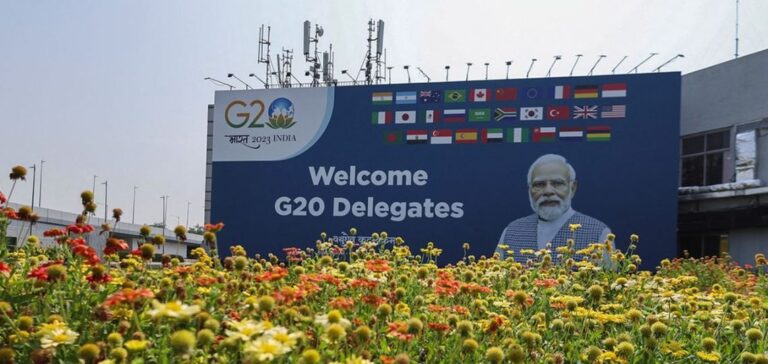The declarations made by G20 members on the fight against global warming are “sadly inadequate” to the urgency of the situation, deplored the head of UN Climate on Wednesday in an interview with AFP, ahead of their summit this weekend in India.
The fight against global warming: The challenges facing the G20 in New Delhi
The G20, which accounts for some 85% of the world economy and greenhouse gas emissions, meets in New Delhi on Saturday and Sunday in the absence of Chinese President Xi Jinping and Russian President Vladimir Putin, against a backdrop of high tensions over the war in Ukraine, the phase-out of fossil fuels and trade issues.
For Simon Stiell, Executive Secretary of the United Nations Framework Convention on Climate Change (UNFCCC), technological solutions to curb global warming are within reach. But geopolitics is a “constraining factor”, he declared in an interview with AFP, on the sidelines of the African Climate Summit.
The meeting in the Kenyan capital Nairobi saw African leaders call for a substantial increase in investment in renewable energies on the continent, reform of the international financial system and greater support for developing countries, which are the hardest hit by climate change despite being the least responsible for it.
G20 under pressure as greenhouse gas emissions approach peak
The G20 summit, which brings together 19 countries and the European Union, is part of a four-month cycle of major negotiations on global warming, culminating in a UN conference (COP28) in Dubai at the end of November. For Simon Stiell, the declarations made by the G20 countries ahead of their meeting fall far short of what is needed.
“The communiqués that have been issued are woefully inadequate, failing to address the crucial issues that need to be resolved by these 20 countries”, he lamented: “There are still attempts to evade and obstruct around these key issues”. – Send a signal” –
A meeting of G20 energy ministers in July failed to agree a roadmap for phasing out fossil fuels, or to support the scientific consensus that greenhouse gas emissions will peak by 2025.
The G20 summit takes place at a time when countries will be receiving the first official tally of their progress towards the targets agreed in Paris in 2015. Under the Paris Agreement, nearly 200 countries have pledged to limit global warming to “well below” 2°C since pre-industrial times, and preferably 1.5°C.
The hope of reducing greenhouse gas emissions, provided we make a full commitment
These assessments are likely to repeat the disastrous conclusions of a series of UN climate reports, highlighting the inadequacy of the global response.
“There’s work to be done at every level,” says Simon Stiell, adding that “the burden of response falls on 20 countries”. He urged G20 leaders to “send a very strong signal about their commitment to tackling climate change”.
On Monday, the head of the International Energy Agency (IEA) called on the United States and China to put aside “their tensions” to tackle climate issues, in an interview with AFP.
The following day, US climate envoy John Kerry expressed his hope that Washington and Beijing could “come closer together”, while stressing that this cooperation would not be achieved “at any price”.
For Simon Stiell, the technologies needed to reduce greenhouse gas emissions by 43% over the current decade – as recommended by UN experts – are within reach if the richest countries step up their efforts.
100 billion a year: A key challenge for the climate
This means meeting their 2009 commitment to provide $100 billion a year in climate financing by 2020, and helping the most vulnerable countries cope with the immediate impacts of climate change.
While the growing calls for reform of the World Bank and the International Monetary Fund to address climate challenges are taking place outside the framework of the UN climate negotiations, they are nonetheless central, stresses Simon Stiell.
“Finance is everything,” he asserts.
Why does it matter?
In terms of business, finance and the energy market, it is essential to keep a close eye on the G20’s actions to combat global warming.
The decisions taken by these major economies will have a direct impact on the global energy transition, investment in renewable energies, and the global response to climate change.
If the G20 fails to take significant action, this could have serious economic and environmental consequences on a global scale.






















